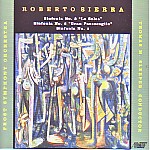Roberto Sierra’s Third Symphony sounds remarkably like one of Morton Gould’s Latin American Symphonettes. Lest this sound like a criticism, bear in mind that I regard those works as absolute gems, and the willingness of Sierra to write music that is light, bright, and effervescent is a wholly positive indication of his compositional range rather than an inability to get serious. Granted, he is more of a romantic than Gould, particularly in the dreamy second-movement Habanera, with its exotic melodic arabesques, and his scale is certainly larger. But this Latin-flavored music has much the same energy, charm, and compositional integrity.
Sierra’s first two symphonies, in any case, showcase his ability to be quite serious, emotionally speaking, without compromising his music’s brilliance. No. 1 is a compact piece that makes charming reference in spots to Beethoven’s First Symphony. It’s a sign of Sierra’s talent that he makes these gestures entirely his own. They don’t sound like borrowings or foreign objects at all. As with the Second Symphony, which is cast in the form of a single-movement passacaglia, the First makes no obvious reference to Latin-American music, but the excitement and rhythmic energy are there all the same. Not the least of Sierra’s gifts is the ability to write highly dissonant music that’s still enjoyable and tantalizing to the ear.
These performances, by the University of Miami’s Frost Symphony Orchestra, are pretty terrific. The playing is excellent, and conductor Thomas Sleeper lets the music sing and dance as the composer clearly intended. There may be a moment or two where the musicians sound a touch stressed (the brass toward the end of the Second Symphony), but if I were the composer I’d be thrilled to use this disc as a musical calling-card. The engineering is also top-notch. I’ve heard some very catty comments about Sierra’s work, as if exploiting one’s own musical heritage while working in large forms is “pandering”. If that is true, then the same must be true of composers as diverse as Haydn, Dvorák, Tchaikovsky, Stravinsky, hell, even Bach. Try this disc, and discover what it is that makes Sierra’s colleagues jealous. [9/21/2007]
































